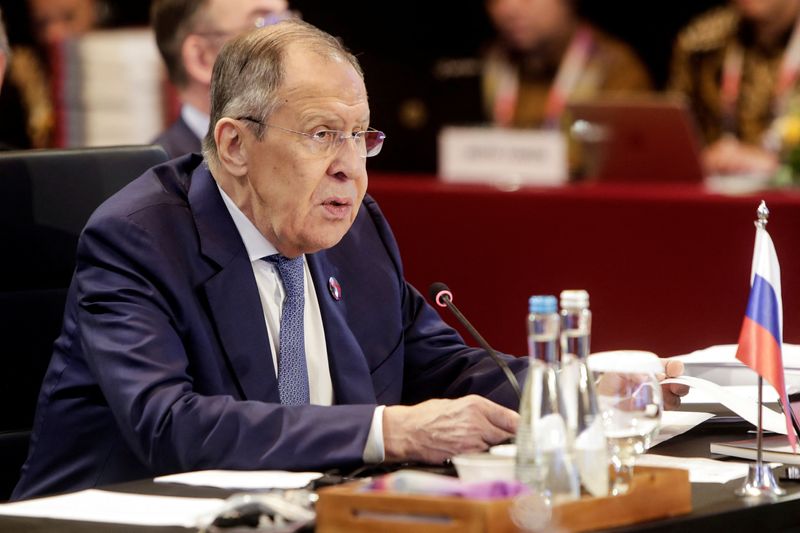By Guy Faulconbridge and Vladimir Soldatkin
MOSCOW (Reuters) – Russian Foreign Minister Sergei Lavrov said on Thursday that he had not heard of any new proposals on the Black Sea grain deal which expires next week but was working with Turkey on ways to ensure Russian grain exports regardless of any deal.
U.N. Secretary-General Antonio Guterres has proposed to President Vladimir Putin that he extend the deal in return for connecting a subsidiary of Russia’s agricultural bank to the SWIFT international payment system, sources told Reuters.
Russia has threatened to ditch the grain deal, which expires next Monday, because its demands to ensure shipments of its own grain and fertilizer have not been met. The last two ships travelling under the Black Sea accord are currently loading cargoes at the Ukrainian port of Odesa ahead of the deadline.
Asked about remarks by Turkish President Tayyip Erdogan who said that Putin had made some suggestions on the grain deal, Lavrov said: “I am not aware of any new proposals.”
Lavrov said Putin and Erdogan had long been discussing plans to ensure that wheat supplies to developing countries continued independent of any other parties.
“Turkey was interested in helping to process our grain and participate in a scheme that would allow us to help developing countries regardless of anyone or anything,” Lavrov said.
FOOD CRISIS
The United Nations and Turkey brokered the Black Sea Grain Initiative last July to help tackle a global food crisis worsened by Moscow’s invasion of Ukraine and blockade of its Black Sea ports.
To convince Russia to agree to the initiative, a three-year pact was also struck last July in which the United Nations agreed to help Moscow overcome any obstacles to its own food and fertilizer shipments.
Ukraine is a major producer of grains and oilseeds and the interruption to its exports at the start of the conflict pushed global food prices to record highs. The current deal helped to bring down prices and ease a global food crisis.
Putin has said the grain deal may be over due to what he cast as the West’s duplicity over continued obstacles to Russia’s own agricultural exports to world markets.
A key demand by Moscow is the reconnection of the Russian agricultural bank Rosselkhozbank to the SWIFT international payment network. It was cut off by the European Union in June 2022 over Russia’s actions in Ukraine.
The EU is considering connecting a Rosselkhozbank subsidiary to SWIFT to allow specifically for grain and fertilizer transactions, three sources familiar with discussions told Reuters on Wednesday.
Guterres has proposed to Putin that Russia allow the grain deal to continue for several months, giving the EU time to connect a Rosselkhozbank subsidiary to SWIFT, two of those sources familiar with discussions told Reuters.
Russian Foreign Ministry spokeswoman Maria Zakharova said last week that Moscow would not be satisfied with such a proposal because it would take “many months” to open a subsidiary and another three months to connect it to SWIFT.
She also rejected a U.N. attempt to create an alternative payment channel between Rosselkhozbank and U.S. bank JP Morgan.
(Reporting by Reuters; editing by Gareth Jones)
